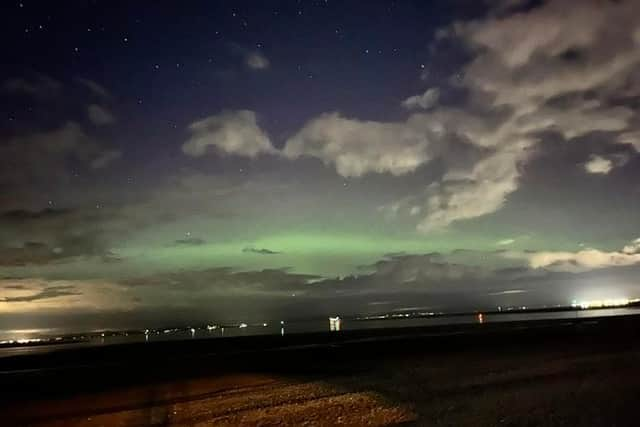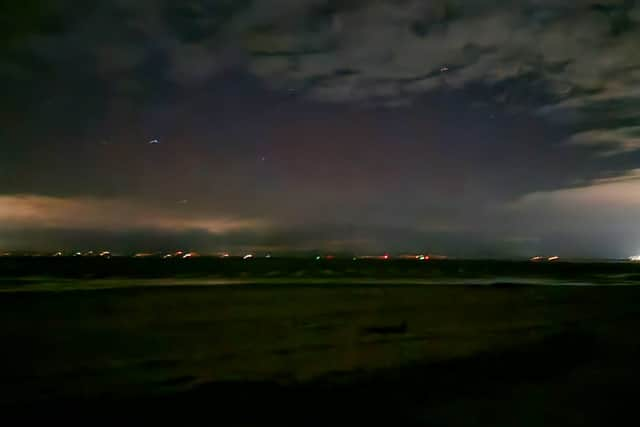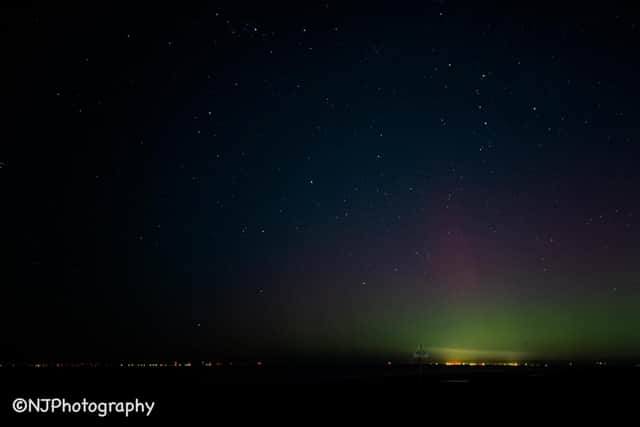Photos show Aurora Borealis lighting up night sky in Fleetwood as Northern Lights seen across UK
and live on Freeview channel 276
The Northern Lights were spotted across the United Kingdom on Sunday night in a surprisingly strong display.
While there was an ongoing weak solar storm, the aurora ended up being visible from Fleetwood.
Why could the Northern Lights be seen in Fleetwood?
Advertisement
Hide AdAdvertisement
Hide AdA sudden spike in solar activity - which causes the lights - saw an aurora "red alert" issued on Sunday evening.
Activity on the Sun has been increasing over the last few years and is expected to peak this year which means the aurora becomes more frequent.


Those who follow aurora activity in the UK were alerted to a sudden spike in solar activity at around 5pm on Sunday evening when a "red alert" was issued by AuroraWatch UK - an organisation from the University of Lancaster that monitors solar activity.
The spike in solar activity lasted until 9pm but there were still some reports of the aurora even after that.
What are the Northern Lights?
Advertisement
Hide AdAdvertisement
Hide AdKnown officially as Aurora Borealis, the Northern Lights are dancing waves of light in the sky, caused by solar particles striking the Earth’s magnetic field.
This incredible occurrence can be occasionally seen in the night sky over Britain.
The northern lights (also known as aurora borealis) appear as large areas of colour including pale green, pink, shades of red, yellow, blue and violet in the direction due north.


During a weak aurora, the colours are very faint and spread out whereas an intense aurora features greater numbers of and brighter colours which can be seen higher in the sky with a distinct arc.
Advertisement
Hide AdAdvertisement
Hide AdThe northern lights are best seen in darkness, away from any light pollution. The lights generally extend from 50 miles to as high as 400 miles above the Earth's surface.
What causes the Northern Lights?
The northern lights occur as a consequence of solar activity and result from collisions of charged particles in the solar wind colliding with molecules in the Earth's upper atmosphere.
Which weather conditions are best to view the Northern Lights?
The best conditions to view the lights are when the sky is dark and clear of any clouds.


Cloud cover ultimately blocks the view of the light. Ideally, the lights will be best viewed away from any light pollution, in remote areas, facing the northern horizon - north facing coasts produce some of the best viewing locations.
Advertisement
Hide AdAdvertisement
Hide AdThe northern lights are most active during the Equinox and Solstice in March/April and September/October.
Where can you see the Northern Lights in the UK?
Predominantly the northern lights are best witnessed in Scotland, North England, North Wales and Northern Ireland.
However under severe space weather conditions, the lights can be seen throughout the UK.
Click HERE to find out more.
Comment Guidelines
National World encourages reader discussion on our stories. User feedback, insights and back-and-forth exchanges add a rich layer of context to reporting. Please review our Community Guidelines before commenting.